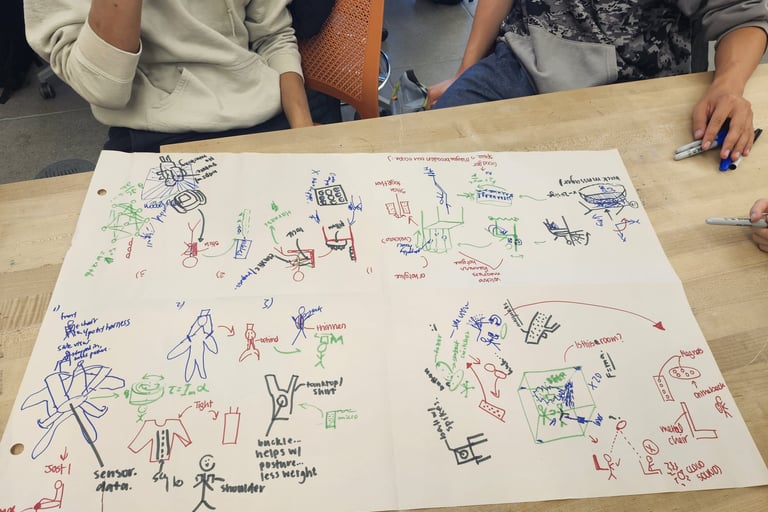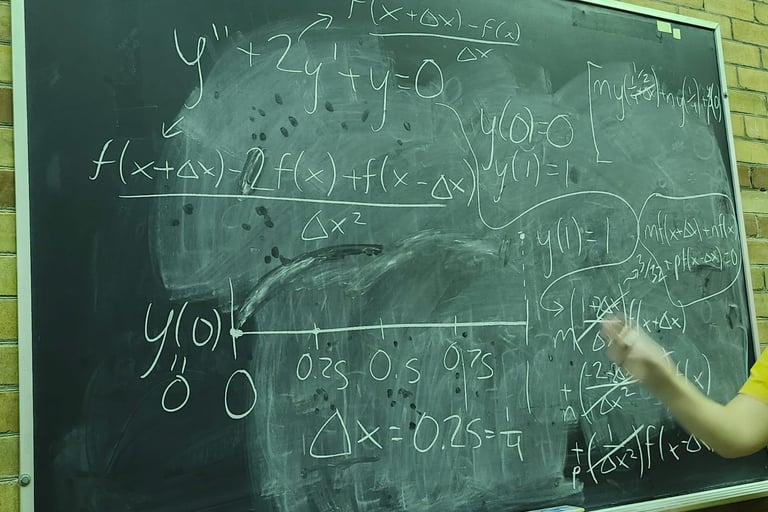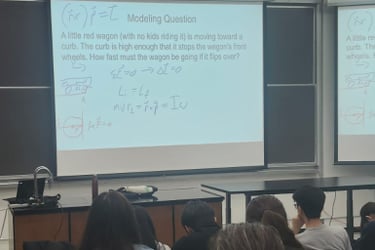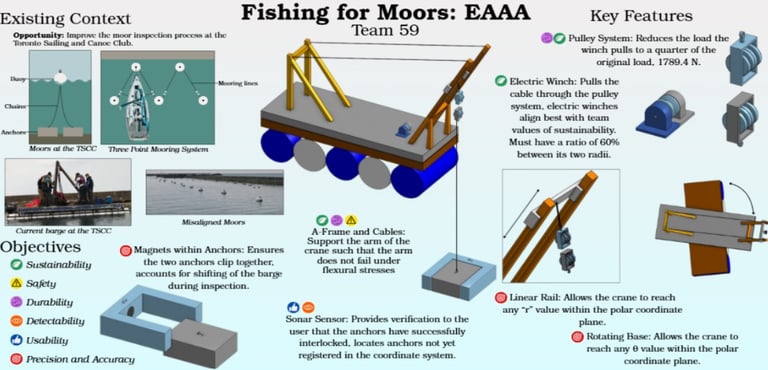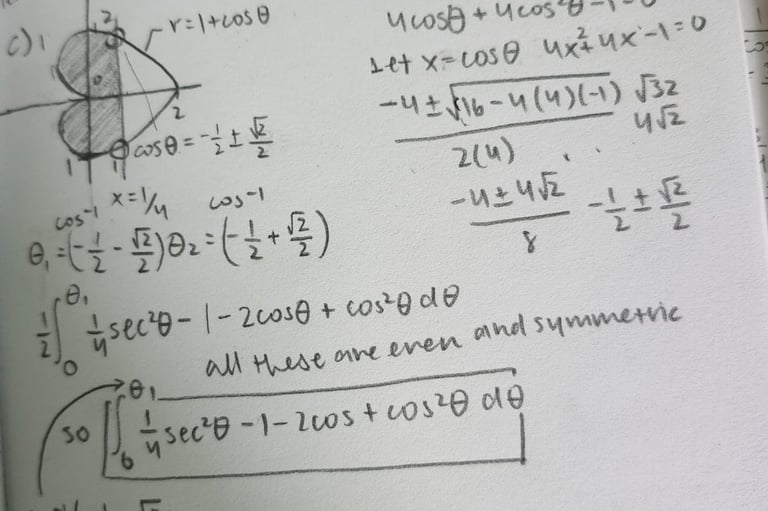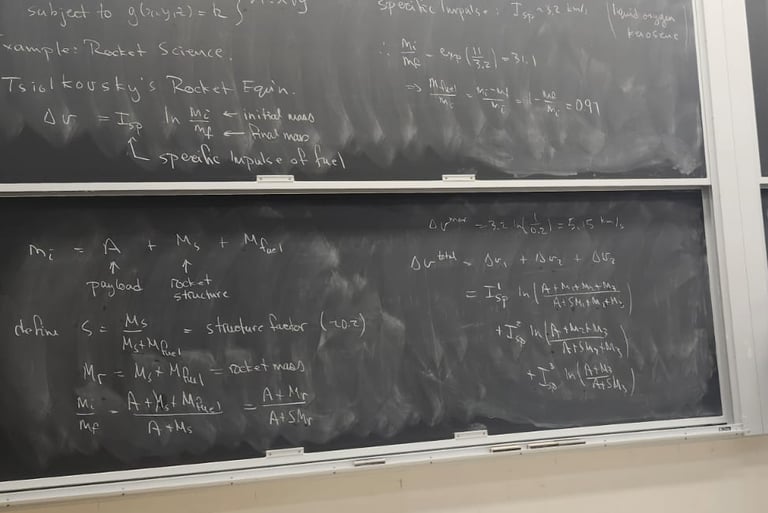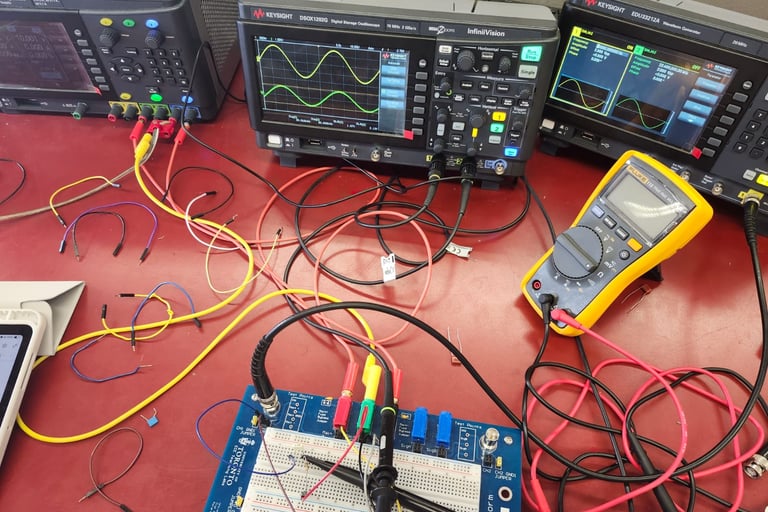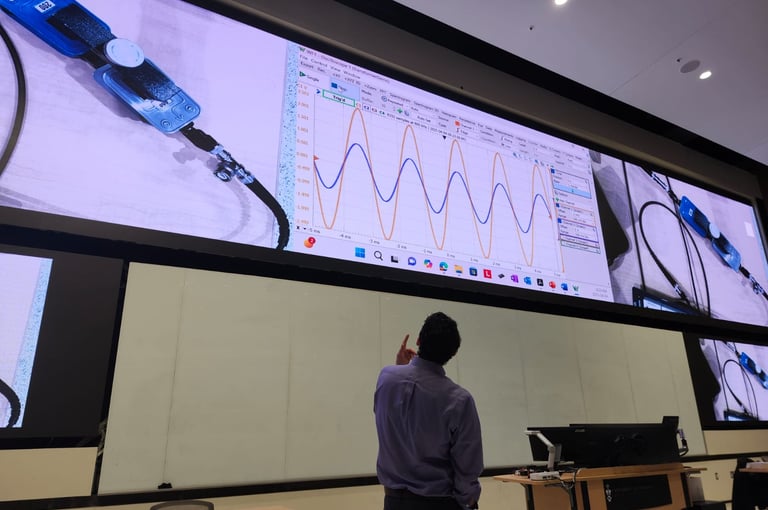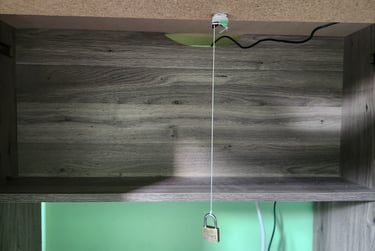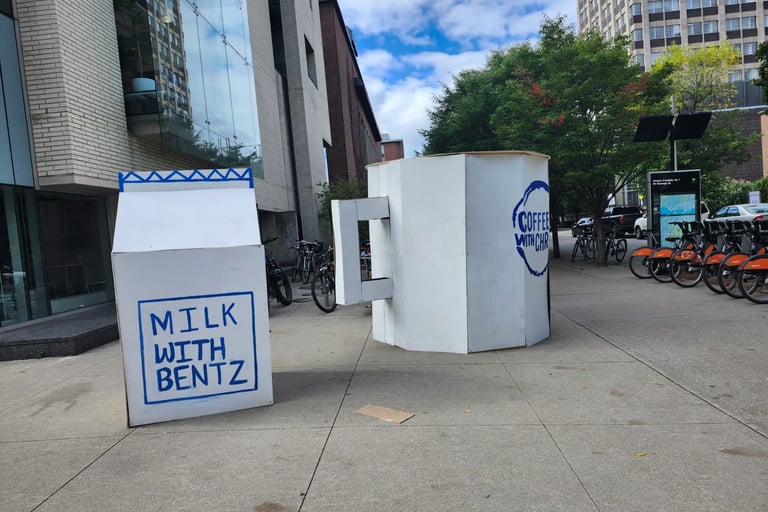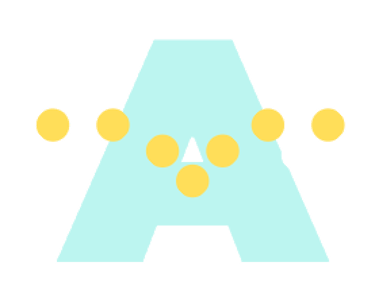Engineering Science: A Review of First Year
Is engsci worth it? Is it as hard as people say as it is?
Aarya Shah
7/2/202518 min read


Oh, to be done first year! I remember entering university all intimidated and worried about how I would make it through 8 months and searching all over the Internet: "How can I prepare for Engineering Science?" or "Is Engineering Science as bad as Reddit tells me?"
But now, being on the other side of the line, I am proud of the learning opportunity I have gained. As I reflect on my first year and the lessons I learnt, I hope this prepares all future generations of incoming Engineering Science students who were in the same situation as I was back then. :D
1. Courses
Engineering Science is considered to be objectively harder than other engineering programs because of its mandatory 6 courses and theoretical (and also rigorous) curriculum. Additionally, all our first-year courses are pre-chosen and diverse, meaning that you will take courses ranging from civil engineering to electrical engineering and engineering design.
Below, I have included all the courses we have taken and an introduction to what to expect in each course.
ESC 101 - Praxis I
There are 3 Praxis courses that you will have to take in Engineering Science, with Praxis I being an Introduction to Engineering Design course. The goal of the course is to provide hands-on professional experience in engineering and to address opportunities. You are put into a randomly-generated team of 4-5 people, and you have a semester to address a Splartz (similar to an 'itch' in entrepreneurship language) that is valuable within the Engineering Science community.
For instance, my team addressed the opportunity to correct back posture among first-year Engineering Science students. This project began by framing the opportunity through an understanding of our stakeholders' needs, goals, and objectives (NGOs), and implementing a requirements framework that targets these NGOs. We later progressed towards the phase where we generate ideas to solve our opportunity (no constraints attached!) Upon exploring a vast design space, we converged and prototyped our top 5 ideas to present during an Alpha Release presentation. The purpose of this assignment is to help find the optimal design to solve your problem. Upon multiple rounds of diverging and converging, we had to converge on our final design to solve our opportunity. Our group chose shoulder straps, and we had to explain why this was the best design decision.
The course aims to teach emerging engineers how to make strong arguments using objectivity and Toulmin's Model. The belief is that data can be subjective, and it is the engineer who brings objectivity to the data and evidence.
Overall, I liked this course because it was a creative course and was a breath of fresh air compared to the technical courses we took. However, this course can be time-consuming and is often hard to do very well in this course. Many lectures often feel like a waste of time, but one way to do well is to make mind maps and pay attention to the important tools, concepts, and models that are used. To learn more, check out our Praxis I design report that we wrote.
ESC 103 - Introduction to Engineering Mathematics and Engineering
Often referred to as a pre-linear algebra course, ESC 103 introduces us to vectors and matrices. For many, this is often a review course from high school that covers dot product, cross product, and projections, and later covers matrix multiplication, Euler's Method and Root Mean Error. This course introduces you to MATLAB, which is a powerful software, but can be difficult to use if coding and programming logic is not your strong suit.
This is an easy course for those familiar with the material. However, this course is often easy to neglect because there are few assignments and homework (we only had tutorial problems every week). Although this may be appealing as you have more time to allocate towards your other subjects, this can lead to last-minute cramming. I suggest doing practice problems, past exams and going to office hours if there are concepts that you do not understand. This course is also quite important for your linear algebra course (MAT 185), so try not to erase everything from your mind once you've taken your final exams.
PHY 180 - Classical Mechanics
Also known as a physics course, PHY 180 combines familiar high school concepts like work, energy, kinematics and forces with concepts like mathematical modelling and "numberless" problems. Depending on the professor, this course can be a breeze or require more practice.
The course gives you a useful skill of making assumptions and approximations to estimate orders of magnitude for your physical models. A sample question could be "What is the maximum force between a hammer and a nail?" This course is quite useful in courses like CIV102 and ESC 101 / ESC 102, where you may need to make mathematical calculations with very few numbers and need to model the question using simple point particle physics. Additionally, we learn how to explain complex physical concepts in simple terms, devoid of any formulas and jargon, using "blog post questions." (Imagine explaining how gyroscopes work to your 6-year-old sister!)
You are also given a Pendulum Project, where you have to test the validity of mathematical models and equations to understand the behaviour of pendulums. This first major lab report is worth 25% of your grade, and you have 3 drafts to improve it. The best way to excel in this project is to ask your TAs for help and advice.
By the end of the course, I became less intimidated by physics and more conscious of the world around me (trust me, it's hard not to think of everything as a modelling problem after taking this course). However, it might feel like there is no correct answer and no amount of problems you do is enough for this course. It is best to study this course in groups so you can learn about the different approaches you can use towards one question, and the orders of magnitude you get. Additionally, I recommend asking ChatGPT to generate a list of practice modelling or numberless questions, and to look at the Pre-Class Essentials and lecture materials ahead of class so you can come to class prepared to solve problems and ask meaningful questions.
CIV 102 - Structures and Materials
CIV 102 incorporates civil engineering concepts, such as stress, strain, and deformation, to teach you the fundamentals of how bridges and buildings are designed. This course is by far the most important, as you will revisit many concepts from this course in MSE 160 and will use this course for designing projects in ESC 102.
This course has weekly assignments and quizzes, and covers a lot of material, making it a very time-consuming course, and it is important to regularly review the course concepts.
You will utilize these course concepts towards a final CIV Bridge Assignment, where you and your team are tasked to design and build a bridge using matboard and contact cement. This bridge must dynamic load of 400N. To learn more about this project, click here.
Besides reviewing your concepts, I strongly recommend reading through the course notes (there is no textbook) and working with your classmates on your CIV Assignments (they can feel long, and it is easy to make mistakes). To learn more about concepts like beam deflection, I recommend "The Efficient Engineer". Finally, the exam for this course is open-book (and worth 50% of your grade!), so make sure to take good notes throughout the term and understand what you are writing. It is beneficial to make conceptual mind maps while studying for the final exam, and do as many past papers as possible, because speed is important in this course (oftentimes students run out of time from solving truss bridges or doing tedious calculations).
ESC 194 - Calculus I
Ahh calculus!! An engineer's best friend and worst enemy. This course is filled with many proofs, ranging from the Mean Value Theorem to Delta-Epsilon Proofs. Oftentimes, students enter this course thinking it will be easy because of their weekly quizzes and because calculus is the one subject everyone is acquainted with since high school. However, it can be difficult to grasp an understanding of the questions, and it is very easy to run out of time.
This course begins with the fundamentals of calculus: the 8 axioms, and later transitions into concepts like derivatives, integration and rates of change. The course is very fast-paced, and it can be hard to comprehend everything the professors are saying in lecture (you will find yourself mindlessly scribbling numbers and not understanding a word).
A strong recommendation for this course is to read the syllabus and chapters from the 8th edition Stewart textbook before coming to the lecture, so you are familiar with what the professor is talking about. After class, do homework to reinforce the learnt concepts right away.
Additionally, many individuals do not go to office hours for fear that they will not learn anything. Most individuals simply memorize formulas and questions, and become confused when their method does not apply to certain situations. The best way to learning in this course is to highlight the problems that were difficult for you, and show your attempted solution to your professor. Understanding why your methodology is wrong is far more beneficial than knowing the correct way to attempt a solution because there is no right way to solve a question, and can help fill gaps in knowledge.
ESC 180 - Introduction to Computer Programming
Here, you will learn how to code in Python and enhance your programming logic. This course covers essential topics like lists, dictionaries, if and else statements, for and while loops, and semantics, which are helpful for future programming courses like ESC 190.
This course is a breeze for individuals with a coding background, and even those without experience can pick up on the language with practice and an open mind.
I recommend doing the labs (and redoing them if you struggled with any of them), asking your TAs and professors for help (they are very nice) and doing as many past exams as possible. Additionally, it is also helpful to ask ChatGPT for coding prompts or use ESC 190 midterm questions and code them in Python instead of C.
Semester 2:
ESC 102 - Praxis II
Praxis II is an extension to Praxis I (you have the same professors as well). You will learn to implement your acquired skills to address opportunities with your local community. For example, our group later chose to work with the Toronto Sailing and Canoe Club to correct misaligned moors that occurred during their inspection process (you can learn more here). Upon working with your group throughout the semester, you will present your final work and next steps at Showcase. Here you have the chance to win awards and share your ideas with your classmates and other stakeholders.
Praxis II does not have any midterms or exams, and 70% of the workload is group work, so it is important to figure out your team's goals and values and to establish a set of rules and regulations.
In this semester, you will also curate an Engineering Design Portfolio highlighting your current position and learnings. This project requires you to reflect on your Praxis I, CIV 102 and Praxis II journey, along with any design team experience you may have gained throughout the semester. It is important to record all your evidence (take photos of everything and write weekly summaries if necessary) so you can easily recall your experiences and write your portfolio.
MAT 185 - Linear Algebra
Linear Algebra is one of the more difficult courses you will have to take this semester, as it is novel from all the courses you've taken in high school and university. This course deals with many proofs and abstract concepts like eigenvalues and ordinary differential equations. This course is also an extension to ESC 103, so it is expected that you know how to multiply matrices and work with vectors. The linear algebra assignments encourage you to think outside the box and apply the knowledge you have towards real-life scenarios. The best way to excel in this course is to ask questions and become a more rigorous thinker (and be more methodical in your work). Additionally, this course provides you with Pre-Class readings and quizzes; it is highly advantageous to take these readings seriously, take notes, and do practice problems. Many of these problems have patterns, and it can be helpful to recognize them.
It is also better to study this course in groups and have discussions, as that can allow you to consider multiple perspectives before reaching a consensus about how to approach a problem. P.S. you will realize quite quickly that, whether you like it or not, linear algebra will show up in many of your engineering courses.
ESC 190 - Data Structures and Algorithms
As previously mentioned, ESC 190 is an extension to ESC 180( you will likely have the same professor). While ESC 180 mainly focused on coding in Python, ESC 190 transitions into C (although you will still need Python in this course). This course also focuses on important algorithms like Breadth First- and Depth First- Traveral, Dijkstra's Algorithm, A*, and introduces you to modern programming concepts like Dynamic Programming, Vibe Coding, and Neural Networks. These concepts can be difficult to wrap your head around, and are quite new that sometimes even ChatGPT or DeepSeek might not be able to help you understand them. It is crucial to develop a fundamental understanding of how to implement these concepts by doing as many practice questions as possible, talking to your professors and TAs and redoing all labs for review.
ESC 195 - Calculus II
Much like ESC 190 and ESC 102, this course continues from Calculus II (except you are not directly tested on your Calculus I knowledge). This course covers topics like polar coordinates (you will learn how to draw cardioids, which are basically hearts), parametric equations, integration techniques, sequences and series, partial derivatives, Clairaut's Theorem and vector functions. This course transitions you from single-variable calculus to multi-variable calculus and vector calculus (which we take in AER210!). However, the professor is the same, and you can do well in this course if you use the same study techniques as you did in ESC 194. (In fact, most individuals find Calc. I harder than Calc II).
ECE 159 - Fundamentals of Electrical Circuits
Probably one of the more hands-on courses you will take in Semester 2, ECE 159 provides you with the logic necessary to solve linear electric circuits. The course takes high school concepts like voltage, current and resistance and provides more in-depth techniques of analyzing and designing circuits, including nodal and mesh analysis as well as superposition. Additionally, you will transition from the time domain to the frequency domain and will learn about AC sources and DC sources, which will require you to understand complex number arithmetic calculations.
This course is a lot of problem solving; circuits upon circuits upon circuits. Some problems can take hours to solve and can get you different answers each time. It is important in these questions to get as much practice as possible and to be methodical in your calculations, because it is easy to get lost in the numbers.
You will also have biweekly labs where you build circuits on a breadboard. The practicals can be tricky at times because it can be difficult to apply theory to practice. It's a good idea ot do all the pre-lab homework and understand the lab manual before showing up. These labs are marked based on how well you do the work and if you can complete all sections of the lab, so show up early and use time wisely.
MSE 160 - Molecules and Materials
Arguably one of the easier courses, MSE 160 touches high school, PHY 180 and CIV 102 concepts ranging from Gibbs Free Energy, Entropy, Enthalpy, stress, strain, Young modulus, work and energy. This course is quite interesting because it tells us how we can use the behaviours of existing materials to create different types of materials (a prime example is how they have made chemical and thermal tempered glass using the behaviours of regular glass as a ceramic). You will learn about microstructures and crystal lattices, and how they influence the behaviour of a material.
This course has weekly demonstrations where there are some interesting surprises, and you get to witness the accuracy of engineering equations and calculations (don't skip out on those demos, they are quite fun).
Additionally, this course is quite stress-free as they do not have as many assignments and quizzes compared to your other courses. However, this can cause individuals to feel behind in the course. The instructor has his own textbook which can be great for notes, but I strongly also recommend occasionally reading through the "Introduction to Material Science" textbook for the APS101 curriculum.
There are also not that many practice questions provided in your tutorials, so it is recommended that you go through as many practice problems (especially the multiple choice) and understand how to do the questions.
2. Extracurriculars
As you can see, the curriculum is diverse and can take time to adjust to the workload. While many individuals join extracurriculars, many first-year students find it's much harder to be fully committed to clubs in this program as opposed to other programs, and it's important to find the balance that fits you.
In my first year, I was the Vice President of Mentorship for N-Sight Mentorship Program, a club dedicated to connecting engineering science students with upper-years and alumni, and providing a supportive network for members to share their insights. I would recommend this club to first and second-year students because it's often challenging to navigate university; you can feel like you're constantly behind or find it difficult to find opportunities. Talking to upper-years who have had the same lived experience as you can be rewarding and help ease the transition into university.
Another one of my favourite clubs is the University of Toronto's Aerospace Team (UTAT). They have 4 divisions within them: Rocketry, Policy, Space Systems and Unmanned Aerial Systems. They are constantly working on exciting and innovative projects (currently, they are building the first liquid propulsion rocket, Discovery). UTAT is one of the many design teams at UofT and they are a great way to build a community, get hands-on experience and learn about what majors or fields in engineering you are more interested in.
4. Learning Opportunities
Being purposeful with your time
You will very quickly find that time management is inevitable. Choosing between hanging out with your friends, getting sleep or getting an extra few percent in your classes is a decision everyone needs to make.
The best advice I have gotten is to be purposeful and efficient with your time. If you know you're not going to function with regular 8 hours of sleep, then why not go to bed rather than trying to finish your assignment (hopefully it's not due the next day) or if you find that you cannot work for more than 1 hour at a time, then why not schedule a small break where you meet with your friends in between.
I found that I was most purposeful with my time when I created a timetable of my day, so I could lay out all the time I had after school. This then allowed me to feel less stressed about how 'little' time I had, as I could plan out my week and target how much time I was hoping to spend on every project.
I was a commuter, and realized I was very productive studying on the GO train because it gave me a 1 hour timer until I had to take a break. I would plan out activities such as readings or pre-class essentials that I wanted to get done specifically for my GO train.
Talk to professors, TAs, upper years, and your classmates.
One of the best parts about Engineering Science is the people: everyone is supportive, smart and ready to give you advice, and the common room is a friendly way to meet your upper years and chat about all your concerns with. Oftentimes, this program has a large workload and you might not have enough time to understand everything on your own; whether it be a CIV assignment or cracking another ECE circuit, it's much better when you ask for help and work with your peers so everyone can learn.
You will realize that everyone went to different high schools and had different experiences, so you can learn a lot from others. However, this can also give you impostor syndrome or a feeling that you do not belong. So while it is important to talk to individuals and hear your stories, know that you're also on the path of success if you put in the hard work and consistency, and your upperyears probably went through the same struggles as you.
Office Hours are GOOD FRIENDS... although they may not always be your BEST FRIENDS.
Similar to the two points earlier, it is important to meet with your professors and establish a good rapport with them. They are there to help you after all. However, I would say to take caution with office hours. Personally, I used to go to office hours because I wanted to learn about other people's questions and meet new individuals. However, I quickly realized I wasn't absorbing the knowledge that was being thrown by my classmates, and I would often leave feeling unproductive with my time. For me, I understood the bigger picture and concepts, but rather made very small mistakes because I had small gaps that would cause me to mess up parts of my method. I realized I needed someone to tell me why my methodology was incorrect, rather than individuals who would just provide me with an answer before I even attempted the question. This perspective changed my approach to office hours. I would go when I found there was a need and a specific question that I needed to understand.
Focusing on your mental health is the best investment you can ever make.
Now, this might sound like common sense, but most individuals are not used to the immense workload of first-year university. They will pull all-nighters, eat unhealthy food and choose to neglect their overall well-being. In my first year, I remember meal-planning and trying to make lunches for myself, joining clubs, making friends, commuting, learning 6 different subjects and also trying to balance getting a social life. Consequently, the first thing that would often go is my sleep, ranging from close to 5 to 6 hours. Sometimes on the weekends, I would get so caught up in my work that I would not meal plan my lunches, only to have to rely on small snacks or the greasy food truck food that was not enough for my brain.
It's important to take care of yourself because your brain and body function best when you give it the love and energy it deserves. You might ask, how do you manage all this, especially sleeping, and once again it comes down to having a good schedule and being purposeful with your time. It's important to say NO to a gathering or to study alone for a few hours if that's what you need.
PRO TIP: for those of you procrastinators wondering how to stop, get the motivation to start studying and effectively manage your time, I'm going to give you a quick tip that has helped me:
Start a timer. Personally, I found starting a 1-hour timer or a pomodoro timer was a great way to get me in the zone of studying. I didn't have to take the 5-minute break afterwards or stop studying after the 1-hour mark if I didn't want to afterwards, for it was the initial inertia that I needed to overcome. Additionally, once I had started my task, I realized I would spend more time than intended (especially for Praxis), which can be detrimental if you have a plan or if you have to prioritize all your subjects. The time method tells you when to stop, or gives you the choice to ask yourself "Is the task at hand so important that I need to finish it, or can I work on it later or just submit it as it is" (you will realize from EngSci that sometimes being a perfectionist can be hard and time-consuming). Finally, a tip in conjunction to this one, if you are doing a problem set or math problem that is difficult or you think you'll need a review from, spend 5 minutes on it, highlight it and move on. Once you're done your homework, revisit the question to see it from a different perspective, spending 10 to 15 minutes on it. If you're still stuck, try looking at youtube videos or flag it a different colour because you want to understand it with your TA/prof. Later, when you're studying for your midterms and exams, if you find that there are so many questions and you don't know when to start, the highlighted questions are a great starter because they help you review the concepts that you thought were challenging.
Changing your mindset, whether it is about studying to learning about new subjects
Let me tell you a funny story... I have never been a programmer, and ever since I accepted my Engineering Science application, I knew I would HATE coding, whether it was in Python, Matlab or C. I would barely try to get by the labs, spending my time towards other subjects, and would be inclined to skip lectures because I just simply HATED the subject. Consequently, I would only study enough to pass in this course, and later regret doing that because the questions were actually easy and reasonable if I had genuinely thought about them and practiced.
Over the semester, I started doing more practice problems, working with my friends to develop my coding logic and I would try to be more systematic with what I was learning. While this took a lot of time and patience, I found that genuinely understanding the concept and logic made me appreciate the code far more than whenever I tried to memorize or look at someone else's code. I started to like coding and as I got better, I was able to do the labs that I first struggled in (because my brain was so stubborn to learn) within 20 minutes and without any assistance. I realized a crucial thing with that course: no matter how much you think you're going to hate the course or subject, never outrightly admit it to yourself. Say "I'm going to get through this course", or "this part of the course is quite unique and interesting" because the only way you will learn is if your brain truly wants to take in the knowledge.
With that, whether you are entering your first year, just finished, or are thinking of applying, I wish you luck on your Engineering Science journey and remember that most of all, it's important to have fun and appreciate the learning process (you're never truly losing anything from the extra knowledge that you're gaining)
